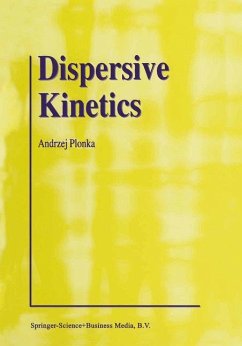Dynamical processes in which many timescales coexist are called dispersive. The rate coefficients for dispersive processes depend on time. In the case of a chemical reaction, the time dependence of the rate coefficient, k(t), termed the specific reaction rate, is rationalized in the following way. Reactions by their very nature have to disturb reactivity distributions of the reactants in condensed media, as the more reactive species are the first ones to disappear from the system. The extent of this disturbance depends on the ratio of the rates of reactions to the rate of internal rearrangements (mixing) in the system restoring the initial distribution in reactivity of reactants. If the rates of chemical reactions exceed the rates of internal rearrangements, then the initial distributions in reactant reactivity are not preserved during the course of reactions and the specific reaction rates depend on time. Otherwise the extent of disturbance is negligible and classical kinetics, with a constant specific reaction rate, k, termed the reaction rate constant, may be valid as an approximation. In condensed media dispersive dynamical processes are endemic and this is the first monograph devoted to these processes.
From the reviews of the first edition: "The author presents the present status of the theory and practice of dispersive kinetics. The book is written at the level of graduate students or specialized higher level undergraduates. It is useful to chemists, biologists, physicists and material scientists dealing with condensed media. ... The five hundred and seventy references at the end of the book are quite adequate in bringing the current status of the subject dealt with in the book. This is a useful book for researchers in the area of dispersive kinetics." (Adabala Ramachandra Rao, Zentralblatt MATH, Vol. 1087 (13), 2006)








